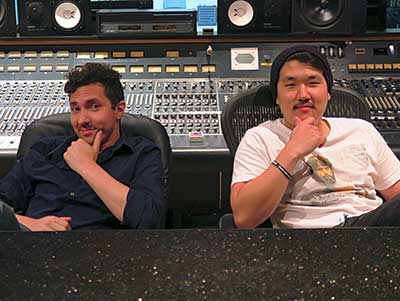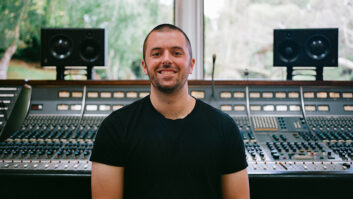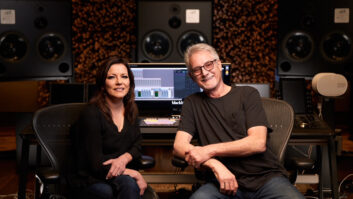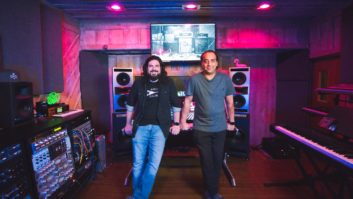
Walking into Recording, Radio, Film, and Culinary Connection (RRFC), you first notice the walls, which are covered with pictures of Larry King, Oliver Stone, Dr. Drew, and Judge Mathis, among many others. These are the partners and endorsers of the RRFC, a licensed apprenticeship program located in Los Angeles Center Studios’ entertainment-based complex. The program, which serves all of the United States, Canada, the UK and Australia, receives approximately 40,000 annual applicants year-round across its four divisions.
James Petulla conceived the program in 1983 with the first of the school’s four divisions: Radio Connection. Originally from a small town in Pennsylvania, Petulla started his career in radio in high school, at 16 years of age. Moving across the continent with the program director from the one-horse town radio station, by the time he was 23 Petulla was working in rock ’n’ roll radio in the Bay Area. He was approached by the 20-campus Columbia School of Broadcasting to teach a course. Here, Petulla advised his students on how to break into the business, namely, by physically being at a radio station.
“In radio, there’s always fluctuation,” Petulla says. “The morning guy wants a better job, the guy working the graveyard shift is tired of it, the girl doing the news doesn’t want to commute across town. During that movement there’s an opening. You don’t go to the stack of resumes and colleges; you hire who you know. The fact that my student was already at the radio station, they’d hire him to do the board op or push gospel tapes on Sunday morning. They hire whoever is already in the door.”
In the early days, Petulla ran small ads in magazines like Rolling Stone and Mix simply stating, “get into radio.” Calls would come in from all over the United States, and from hearing the person’s voice, Petulla could gauge whether they were right for radio. Asking for the caller’s three favorite local radio stations, Petulla would then leverage his extensive list of radio contacts at the stations, reach at least one program director and ask to give his person an interview, and if they passed that stage, an apprenticeship at the station.
Fast forward six years and Recording Connection was added, following the same model, with Film Connection coming in 2000, and Culinary Connection in 2013. The model is simple: on-the-job, one-on-one, apprenticeship-based training from a mentor in your field of interest who is local to where you are based, while following a set curriculum at home with the option to take advantage of online tutoring. You work at your own pace, full time or part time, with as little as two days or as many as five days a week onsite with your mentor. RRFC charges under $10,000, which includes the online tutoring and the software programs used in your course of study. While federal aid is not available, the school offers payment plans and private loans through Tuition Options.
In order to get to this point, however, the applicant has to pass a three-tier interview process. Of the 40,000 fee-free applications, RRFC accepts, at most, 1,500 students a year. Ten individuals in the Admissions Department call every single applicant for the first tier of interviews. These 10 have all completed a post-secondary education in one of the fields RRFC offers and are, or have worked, in those fields. They also have gone through a rigorous 30-day interview training process. Their job is to filter through the applicants, speaking to them frankly about their expectations and determining whether they have realistic goals. If necessary, these 10 also speak to the families of the applicants, to get a better understanding of the applicant’s mindset. This interview process could take up to two weeks and multiple conversations that include questions about how long the applicant has been involved in their particular industry of interest, what type of experience they have in it, and how passionate they are about it. Previous experience is not a requirement, but it does determine how much weight is given to each area of questioning.

“The only reason we don’t accept everyone is because of the nature of what we do,” says RRFC’s Chief Academic and Operating Officer, Brian Kraft. “We’re sending people to some of the most important recording studios, radio stations and film companies in the world, including United Recording, The Engine Room, Serenity West, The Record Plant, Quad Studios, Colorado Sound, ESPN, ABC, and literally thousands of boutique studios and film companies. These are legitimate businesses, and those mentors only want people that really want this, want to bleed for it, sweat for it and cry for it. What we’re trying to find is the kid who has made three terrible short films on his iPhone and is obsessed with it and knows a lot about horror films and Quentin Tarantino and is a geek for it. We’re looking for the girl who is in a band and has played guitar for nine years, can show us songs she’s written and now wants to get to the place where she can record them herself. We want to introduce that type of person to our mentors.”
If the applicant passes the first stage, they arrive at tier two of the interviewing process, the Head of Admissions Department, which is, essentially, more of the same but with 11 individuals who have more experience in vetting. At this point the interviewers also determine which mentor within an hour’s driving distance of the applicant would be a good fit. They know what the mentors are looking for, they know their availability, and can ascertain if it would be a good match.
Once the applicant has passed this tier, they are set up with and prepped for an interview with their mentor at their place of work. That is the third tier, and the one that determines whether or not they are accepted to the school. During this interview is also a good time for the applicant to vet RRFC by asking the mentor—someone clearly established in their field—whether or not RRFC is the right place for them, and the best way to enter that field.
Now enrolled in one of RRFC’s programs, the student interacts with Student Services. Every two weeks or so, someone from RRFC will call the student to make sure they are getting what they were promised and addressing their concerns and questions.
Student Services also regulates the mentors, making sure they are doing their part, following the curriculum and giving the student the required one-on-one time. Another aspect of Student Services is the aforementioned online, screen-sharing tutoring, which is available Monday through Friday from 9 a.m. to 6 p.m. PST, but the student can request a different time that works better with their schedule. The online tutoring is a particular perk, as the student can pursue learning other software on top of what they are learning as part of their course of study.
For Recording Connection, the lessons include written portions, which students complete online and bring to their mentor. The mentor has access to the answers to these assignments, and will go over the student’s work with them. Then comes the hands-on portion to the same assignment, which the mentor then directs the student through. The time it takes to complete the online portion is up to the student and their ability and availability, but is typically four to eight hours a week. The private lesson with the mentor is one to two hours, with an additional eight to 10 hours of hands-on learning, minimum. Ideally the pace will be a lesson per week, and mentors are encouraged to either do projects from the school’s suggested list, or to use students as assistants in sessions. Whether the student is with the mentor two days a week or five, the cost is the same, and their final mixdown serves as their final exam.
“The method is simple: do your homework as best you can so you’re bringing something finished to your mentor to study with one-on-one,” Kraft says. “Part of what makes this special is what you learn on the job by watching someone do it, or doing it yourself, which is the only way to learn.”
The courses for Recording Connection—whose applicants tend to skew younger, around 18 to 25 years old—include audio engineering and music production in Pro Tools, master equivalent in Pro Tools for music producers and engineers with journeyman mentors, Ableton Live music creator for EDM or IDM, Performance Ableton Live music creator platinum (which includes submitting music to record labels), and Logic music creator for hip-hop or EDM/IDM. Any of these can be genre-focused. For Recording Connection applicants who have already completed a music education, RRFC offers the Learn From Legends program, which is a master’s program of sorts, and different from the Advanced Audio program, which is an extension of the basic audio program, and not necessarily with a legend, per se.
“We were meeting a lot of Grammy-winning engineers and producers who we found out really wanted to be mentors, they are ready to give back,” Petulla says. “We can’t give someone with no background doing our basic program to an Al Schmitt or a Niko Bolas, but we can put them with someone who has finished our program or they’re a graduate of another audio school. Legends is a flexible curriculum. It can be structured exactly on what that person is looking for [that is, mixing, mastering, recording big bands, composing, post production, scoring, songwriting], and what kind of time the mentor can put in, then figuring out a price point that works for both.”

Schmitt and Bolas don’t need vetting, but RRFC does screen its mentors extensively. For Recording Connection, they look for people with 10-plus years of work experience. The owner of the studio is contacted, which in small towns is usually also the operator of the studio. In a larger studio, clearance is obtained from human resources or the owner, who also vouches for the chief engineer, who is the one RRFC targets as the mentor. With the web, it’s easy to look at the person’s credits and see their studio. The mentor needs to be willing to follow RRFC’s curriculum—which is viewable online. The mentor gets paid $200 per lesson. What the school is not looking for is someone who is looking at the mentorship as income.
“We find our mentors when we find our student,” Petulla says. “We have a bunch of mentors, but say a student calls from Anchorage, Alaska, we have someone there but we have to see if that mentor already has a student, can they do it now, and we may have to access our vast network of working professionals who recommend new mentors. We hook up 10-20 new mentors a week because we don’t want to stack students.”
This way of thinking is conducive to the entry-level job placement RRFC prides itself on. Even if a studio calls asking for more students, RRFC may not place a student there if they already have other students in place at that location. “Job placement is built in because you’re already there,” Petulla says. “We’re better off putting the student where there aren’t other people because the odds of getting a job are better. It’s harder for us, but it’s better for the student to only have one person there. If they can’t get hired there, we try to help them get placed elsewhere.”
Graduates tend to stay in their hometowns, where they did their apprenticeship, which RRFC encourages. For one thing, again, it’s easier to get a job where you already are apprenticing. For another, there is no guarantee if you move to the music hubs that there will be a job waiting for you there. This is one of the benefits of not having a centralized campus and saturating the market where you are located.
“I adopted the age-old mentor/apprenticeship approach in learning,” Petulla says. “In the 12th century, there weren’t schools. Your family would pay for you to work for free with the master because they knew you’d eventually get in. It’s the same concept. It’s our—meaning, the RRFC and the more than 1,500 audio engineers, filmmakers and broadcasters that work, mentor, tutor and teach for us—answer to our educational system in any career.”







